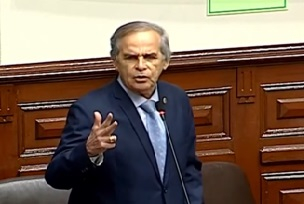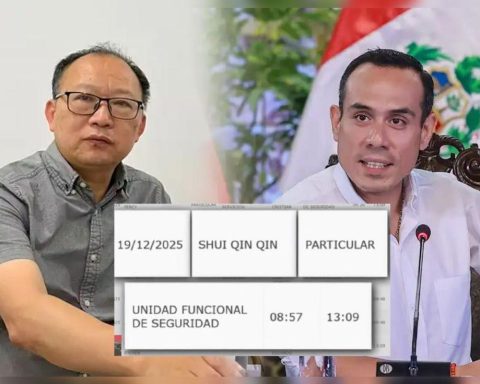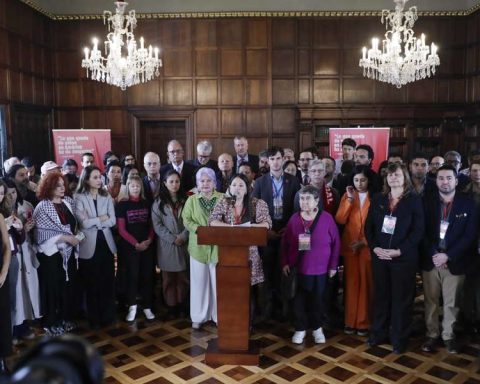The Minister of Defense, Walter Astudillo, preferred to answer in a reserved session the questions related to the process of acquiring combat aircraft for the Peruvian Air Force (FAP), appealing to “reasons of national security.” However, during the intervention of the congressmen from the different groups, they cited information that Astudillo presented when answering the questioning document.
The head of the Ministry of Defense supported allocating US$3.5 billion to the purchase of 24 latest generation fighters, because for 12 years the FAP has increased the requirement due to the obsolescence of the available material. Given this situation, Astudillo pointed out, it is a constitutional mandate to modernize the air war fleet for the defense of sovereignty.
On these aspects, the majority of legislators agreed. But there were also several who doubted the transparency of the contracting process, due to recent events registered in the current Government.
The case of the rifles
The congressman who expressed this position was Fernando Rospigliosi, from Fuerza Popular, who, on behalf of his group, supported the Armed Forces, as well as the equipment renewal program so that they fulfill the missions entrusted to them. However, he demanded explanations from Minister Walter Astudillo for the failure to comply with a purchase contract for 10,000 Israeli Arad 7 rifles, between the state company Fábrica de Armas y Munitions del Ejército (FAME) and the military institution. The contract was signed by the current Government.
“We have to point out the irregularities that exist in certain acquisitions that make us doubt that the Armed Forces and the Ministry of Defense are acting correctly. For example, the case of the Arad 7 rifles that were acquired without bidding through an order that the Army placed with FAME, and FAME buys whatever it wants, explained Fernando Rospigliosi.
As several investigative reports from La República have detailed, in fact, the Army initially called for bids from several foreign companies, which brought their models to the country to compete and be tested. Suddenly, the former general commander of the Army, General David Ojeda Parra, annulled the process. And in coordination with the then president of FAME, General César Briceño Valdivia – who at that time was his second – he asked him to make an offer. He was introduced to Arad 7 by Israel Arms Industries (IWI).

More questions
Rospigliosi indicated that the former president of FAME, General Briceño, now converted into general commander of the Army, must respond because the one-year delivery deadline has not been met. In this way, he emphasized, one cannot have confidence in the transparency of military acquisitions.
“Yes, we support the renewal of military equipment, but we have serious doubts about the ability of the Ministry of Defense, as in this and other cases, to acquire quality material honestly,” said Rospigliosi.
FAP technical evaluations have identified three potential fighter models (see infographic): the F-16 Block 70 Viper (United States), the Dassault Rafale F3R (France) and the SAAB Gripen E/F (Sweden).
According to the sources consulted, the choice will depend on the definition of the acquisition and operation cost, the disruptive technology, deterrence capacity, adaptability to the Peruvian geography, the country’s sustainment and logistical capacity to keep the fleet operational, among others.
The first contacts have been registered with the US, French and Swedish authorities, taking into account that the contract will be carried out through the government-to-government modality. The acquisition process itself corresponds to the Armed Forces Purchasing Agency (ACFFAA).
Although some congressmen questioned that US$3.5 billion is allocated to the modernization of the FAP fighter fleet, instead of spending the extraordinary amount on roads, hospitals and schools, Minister Walter Astudillo alleged that there are other budgets for these purposes, and that it was imperative to have a deterrent air force.
Between necessity and opacity
During his speech, Congressman Roberto Sánchez (Together for the People/Voces del Pueblo) cited three reports from the Comptroller’s Office related precisely to hiring during the current Government, which are under question: the acquisition of 30 8×8 armored vehicles by of the Army, which was frustrated due to opposition from the Armed Forces Purchasing Agency (ACFFAA); the modernization of 4 submarines by the Industrial Services of the Navy (SIMA) and the acquisition of 10,000 Arad 7 rifles.
Sánchez, from a point of view similar to that of Rospigliosi, drew attention to the Government’s intention to spend US$3.5 billion on aircraft, when it has recent records of lack of transparency in contracting that have been reported by the Comptroller’s Office.
Former Minister of Defense and congressman Roberto Chiabra lashed out at those who are against the so-called FAME law No. 31684, which he promoted and obtained the majority vote.
“(Now they don’t want the FAME law), it will be because it neutralizes all those infamous lobbyists who oppose all acquisition processes of the Armed Forces. They are the same ones who were against the Defense Fund. And now they are desperate and what they want is to repeal the FAME law. Why? Do they not like it or is it not convenient for them?†Chiabra argued in obvious reference to Fernando Rospigliosi, who has presented a project to annul the aforementioned rule.
“What we have to control is that acquisitions are made with transparency and without corruption. So that history does not repeat itself. Let’s be more sincere and say if we are in favor of national defense or other interests,” Chiabra said in a sarcastic tone at the end of his speech.
Box
ASTUDILLO: “CORRUPTION IS A THREAT�
“If the responsibility for national defense belongs to the Armed Forces, how do we expect that function to be fulfilled if we do not grant it the necessary capacity to fulfill that function?,†said Minister Walter Astudillo. at the end of the intervention of the congressmen.
“Of course there are priorities, but security aspects cannot be contrasted with development aspects,†he said.
â—� “We have to recognize that corruption is one of the main threats that affect the security and development of the country. And that is why supervisory entities exist, such as the Public Ministry. When a hint of corruption is seen, a complaint must be made immediately to the Public Ministry,” Astudillo responded to the recent Armed Forces contracts intervened by the Comptroller’s Office.
















